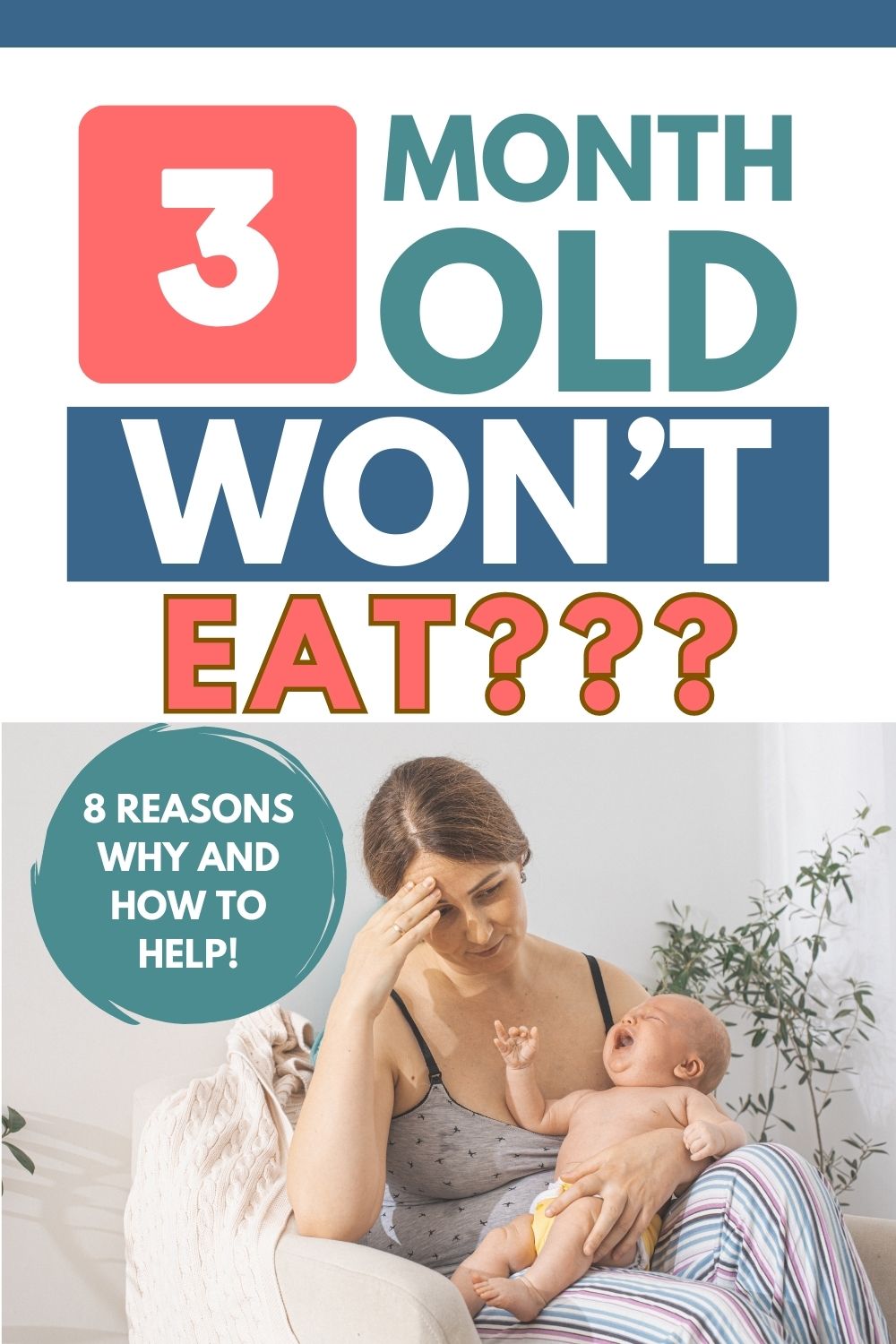8 common reasons your three month old will not eat. Reasons include a wonder week, distraction, baby being a faster eater, slow milk flow, pain, sickness, constipation, and more!

Once your baby hits 3-months-old, you will likely notice a change in your baby’s feeding schedule and patterns. You will probably notice your baby does not seem as interested in eating.
This can be very concerning for parents. We all want to make sure our babies get enough food and nutrition, and it is very concerning if they suddenly seem like they do not want to eat.
The good news is that this is actually very common behavior for a 3-month-old baby! This may just be a normal part of developmental milestones and you have nothing to worry about.
You may, however, have a cause for the seemingly poor eating habits that you can address.
Below are 8 common reasons for a baby to stop eating well along with what you can do about it.
Post Contents
Wonder Week
The 12 week wonder week is one of the main reasons a 3 month old does not eat well. Baby’s appetite seems to diminish during this wonder week. It does come back once it is over.
Wonder weeks are typically thought of in conjunction with a sleep regression, but not necessarily a food issue.
>>>Read: Wonder Weeks Review
Slow Milk Flow
Your baby may be frustrated with trying to eat because of a slow flow. This can be true if you are breastfeeding or bottle feeding.
If you bottle feed, your baby might be ready for a faster flow nipple. Try the next size up and see if your baby will eat well again.
If you breastfeed, your baby might be impatient when waiting for the letdown to happen. If that is the case, you can hand express before you start to nurse your baby to get the letdown started before baby latches. You can also try to relax and remove distractions from yourself until the letdown starts.
A slow flow of breasmilk can mean that you have a low milk supply, so take that into consideration, also.
Distracted
As your baby hits 12 weeks old, they will become far more distracted when eating. They are starting to notice the world around them more. They notice that sound, smell, or object and they want to study it and know what it is.
So your baby might eat for a few minutes – just enough to not be super hungry – and then start studying their surroundings. I had a baby would would constantly unlatch and stare at the ceiling fan.
Your baby is also more social as a three month old. Your baby will want to smile at you and look at you.
You can help this in a few ways. One is to always feed your baby in the same location. That way the location will be less interesting because your baby is used to the surroundings. You can also spend some playtime in that area to further familiarize your baby with the space.
You might need to start to feed baby in a dark room that is quiet. This is especially true if you have older children. Older siblings can be terribly distracting! Find something safe for your older kids to do while you feed your baby.
Faster Eater
Your baby might just be a faster eater. If you are bottlefeeding, you know if your baby is eating the typical number of ounces of formula or pumped milk or not. If you are breastfeeding, however, you will not be sure if baby is just a faster nurser now or not quite done eating.
It is common for a baby to be able to eat faster right around 3 months old. So make sure your baby is indeed not fully done eating before you start to stress about why your baby isn’t eating.
>>>Read: How To Tell if Baby is Getting a Full Feeding
Pain or Sickness
Your baby might not be eating well due to pain, sickness, fever, or ear infections.
If your baby has reflux, make sure the meds are the correct dosage for your baby’s weight. Reflux can cause pain in the esophagus and make your baby less interested in eating.
If you breastfeed, be aware if you have foods that lead to your baby having reflux flare ups. For my reflux baby, I could not eat chocolate.
>>>Read: Babywise and Reflux
Check and see if your baby is sick. It is harder to drink when your nose is stuffy. Many sicknesses also lead to a decreased appetite.
A stomach bug will obviously prevent your baby from wanting to eat. No one wants to eat when they are vomiting.
You should also check and see if you or your baby have a thrush infection. Thrush very commonly makes a baby less interested in food.
While it is rare at this age, it is possible your baby is having teething pain that is making her less interested in eating.
Constipation
If you have ever been constipated, you know you aren’t very hungry when you are. If your baby is constipated, he might not be interested in adding more food to the digestive system.
End of Growth Spurt
It might seem like your baby is eating less, but in reality, she is just at the end of a growth spurt. Last week she was eating a ton and has cut back this week. This can be normal after a growth spurt is over.
If you pay attention to wet diapers, you can have a better idea if you should be concerned or not. If your baby’s wet diapers are the same as they have been over time, you do not need to worry. This will indicate that your baby is getting the right amount of liquids each day.
>>>Read: Baby Growth Spurts: Everything You Need To Know
Baby Doesn’t Like Your Diet
If you are breastfeeding, your baby might be resisting eating because you have eaten something he doesn’t like, is intolerant to, or is allergic to. When we eat foods that lead to allergies, we tend to avoid those allergies.
Think through if you may have eaten a new food that could trigger food intolerances. Cut that from your diet and see if that helps.
Along the same lines, if you feed pumped milk, it is possible you have high lipase in your breast milk and baby does not like that. There is nothing wrong with your breastmilk if you have high lipase, but it will taste different and not all babies are okay with that.
>>>Read: High Lipase in Breastmilk: Why and What To Do
A Combo of Above
It is possible there is a combo of the reasons listed above that is leading to your baby eating less. Keep that in mind as you troubleshoot to try to make sure your baby is getting a full feed.
Conclusion
It is very common for a baby to not eat well once they hit three months of age. Work through this list as you try to figure out why your baby will not eat all of a sudden. If it is simply developmental, it will pass! And remember, your baby will not be content to starve. Eating will come.
Related Posts
- Reasons for Feeding Baby Sooner than 2.5 Hours
- Troubleshooting Common Breastfeeding Difficulties
- Thrush Infection When Breastfeeding
- Hunger Cues: How To Know if Baby Is Hungry
- Cutting Chocolate when Breastfeeding
- Nursing Woes {Baby Playing While Breastfeeding}

Sign up for my emails to get weekly parenting helps and ideas to help you be the best parent you can be! When you sign up, you also get a free “Sleep Totals” sheet to help you know how much your child should be sleeping, from newborn to teen!

